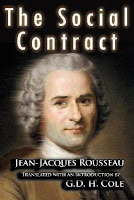 Second Treatise of Government
Second Treatise of Government
by John Locke
The Second Treatise of Government places sovereignty into the hands of the people. Locke's fundamental argument is that people are equal and invested with natural rights in a state of nature in which they live free from outside rule. In the state of nature, natural law governs behavior, and each person has license to execute that law against someone who wrongs them by infringing on their rights. People take what they need from the earth, but hoard just enough to cover their needs. Eventually, people begin to trade their excess goods with each other, until they develop a common currency for barter, or money. Money eliminates limits on the amount of property they can obtain (unlike food, money does not spoil), and they begin to gather estates around themselves and their families.
People then exchange some of their natural rights to enter into society with other people, and be protected by common laws and a common executive power to enforce the laws. People need executive power to protect their property and defend their liberty. The civil state is beholden to the people, and has power over the people only insofar as it exists to protect and preserve their welfare. Locke describes a state with a separate judicial, legislative, and executive branch--the legislative branch being the most important of the three, since it determines the laws that govern civil society.
People have the right to dissolve their government, if that government ceases to work solely in their best interest. The government has no sovereignty of its own--it exists to serve the people.
To sum up, Locke's model consists of a civil state, built upon the natural rights common to a people who need and welcome an executive power to protect their property and liberties; the government exists for the people's benefit and can be replaced or overthrown if it ceases to function toward that primary end.






